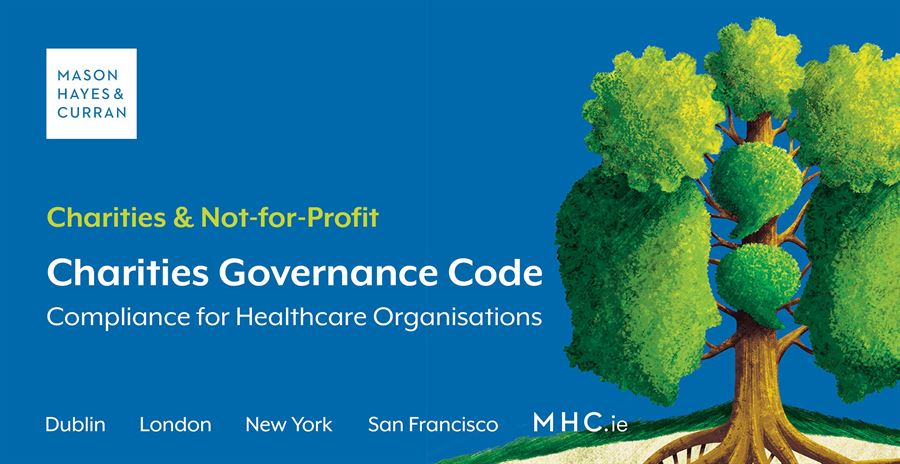
This year, all charities, including voluntary hospitals and healthcare providers with charitable status, must complete an annual Compliance Record Form to comply with the Charities Regulatory Authority (CRA) Governance Code (the Code). For voluntary hospitals and healthcare providers already facing a multitude of ongoing governance obligations, this addition may be a daunting prospect. Our charitable healthcare clients continue to be under immense pressure to deliver services in extremely demanding circumstances. However, despite the enormous difficulties facing healthcare organisations as a result of the pandemic, it is essential not to miss this compliance obligation. We set out the key points for those who have not yet adopted the Code.
Key points
-
The Code sets out six core principles for boards to apply in the governance of their organisations. These core principles are broken down into specific standards to be met. Smaller organisations must meet 32 specific standards, whilst larger, more complex organisations must meet 49 standards.
-
Compliance with the Code entails the completion of a detailed Compliance Record Form, to be submitted to the CRA annually.
-
The Code operates on a ‘comply or explain’ basis and so although it is not necessary to meet each specific standard, organisations must be able to explain why they do not comply with certain specific standards, if applicable.
-
It is not sufficient to simply state that you are in compliance. Compliance with each specific standard must be demonstrated as part of the Compliance Record Form. This might include adopting certain policies, or discussing a certain standard at board level and reflecting this discussion in a board minute.
-
Boards are then required to formally adopt the Code at a Board meeting.
Compliance with the Code will require ongoing engagement and review, as charities are required to report on compliance annually. We recognise that imposing good governance across the charities sector is a welcome development that will encourage public trust and confidence in the sector. At the same time, completing the Compliance Record Form and ensuring compliance is properly documented is a time-consuming and resource-intensive task. Healthcare charities are currently facing enormous pressure in the context of the COVID-19 pandemic. As a result, we acknowledge that some may find the process challenging when combined with the numerous other issues facing them at present.
A possible alternative?
The growing number of governance obligations facing healthcare charities undoubtedly poses challenges, though healthcare providers overall are deeply committed to operating according to best practice standards of governance. Given that the vast majority of healthcare charities are funded by the HSE under section 38 or section 39 Service Level Agreements, they are already subject to an onerous regime of governance standards. These include, for larger organisations, the HSE’s Annual Compliance Statement process which effectively operates as a Code of Governance for the sector. It is worth considering whether the sector might consider seeking a group exemption from the Code that would take account of the significant governance obligations already imposed via the HSE.
A similar approach has been adopted in the education sector, where primary schools are deemed to comply with the Code where they can demonstrate adherence to the Governance Manual for Primary Schools 2019 – 2023. An approach such as this could reduce duplication of effort for healthcare charities, freeing up resources to instead be applied in furtherance of the charity’s objects.
Conclusion
It is essential that relevant healthcare charities that have not yet completed their Compliance Record Form start the process without delay. We have significant expertise in assisting healthcare organisations through the process of completing the Compliance Record Form, and have developed a suite of comprehensive and best-in-class templates for both the Compliance Record Form and the various policies and documents needed as evidence of compliance. We can also guide your Board through the process of agreeing the contents of the Compliance Record Form and formally approving it. Once this process has been followed, you can declare yourself to be a “CRA Governance Code compliant charity”.
For more information and expert advice on successfully navigating the challenges during the coming year, contact a member of our Charity Law & Not-for-Profit team.
The content of this article is provided for information purposes only and does not constitute legal or other advice.




